HRMT20025 Report: Australian Banking Industry Recruitment Analysis
VerifiedAdded on 2022/12/27
|13
|3353
|61
Report
AI Summary
This report analyzes the human resource management and employment relations challenges impacting the recruitment of international managers in the Australian banking industry in 2019. It addresses the context of the Royal Commission into Misconduct in the Banking, Superannuation and Financial Services Industry and its implications on recruitment policies. The report explores current issues like stricter regulations, skills gaps, and limitations in the mid-career candidate pool, which affect the recruitment of international talent. It examines the changing recruitment processes and the need for banks to prioritize adaptability and morality in their selection criteria, as well as the impact on HR practices, including a shift towards data-driven talent solutions. The report also highlights the importance of employee retention and the challenges faced by banks in retaining international employees. The report provides recommendations for the CEO of a major bank to navigate these complex challenges.
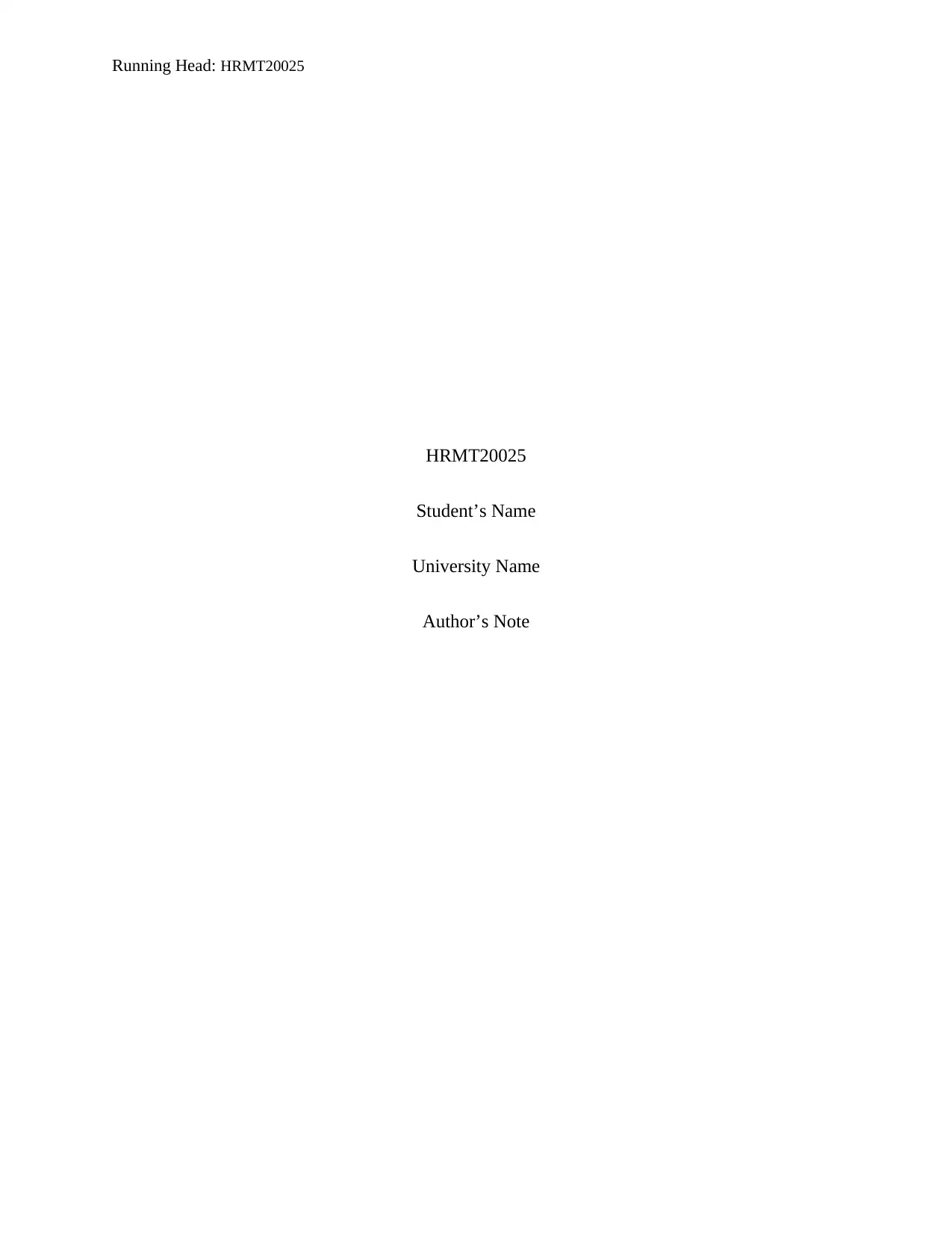
Running Head: HRMT20025
HRMT20025
Student’s Name
University Name
Author’s Note
HRMT20025
Student’s Name
University Name
Author’s Note
Paraphrase This Document
Need a fresh take? Get an instant paraphrase of this document with our AI Paraphraser
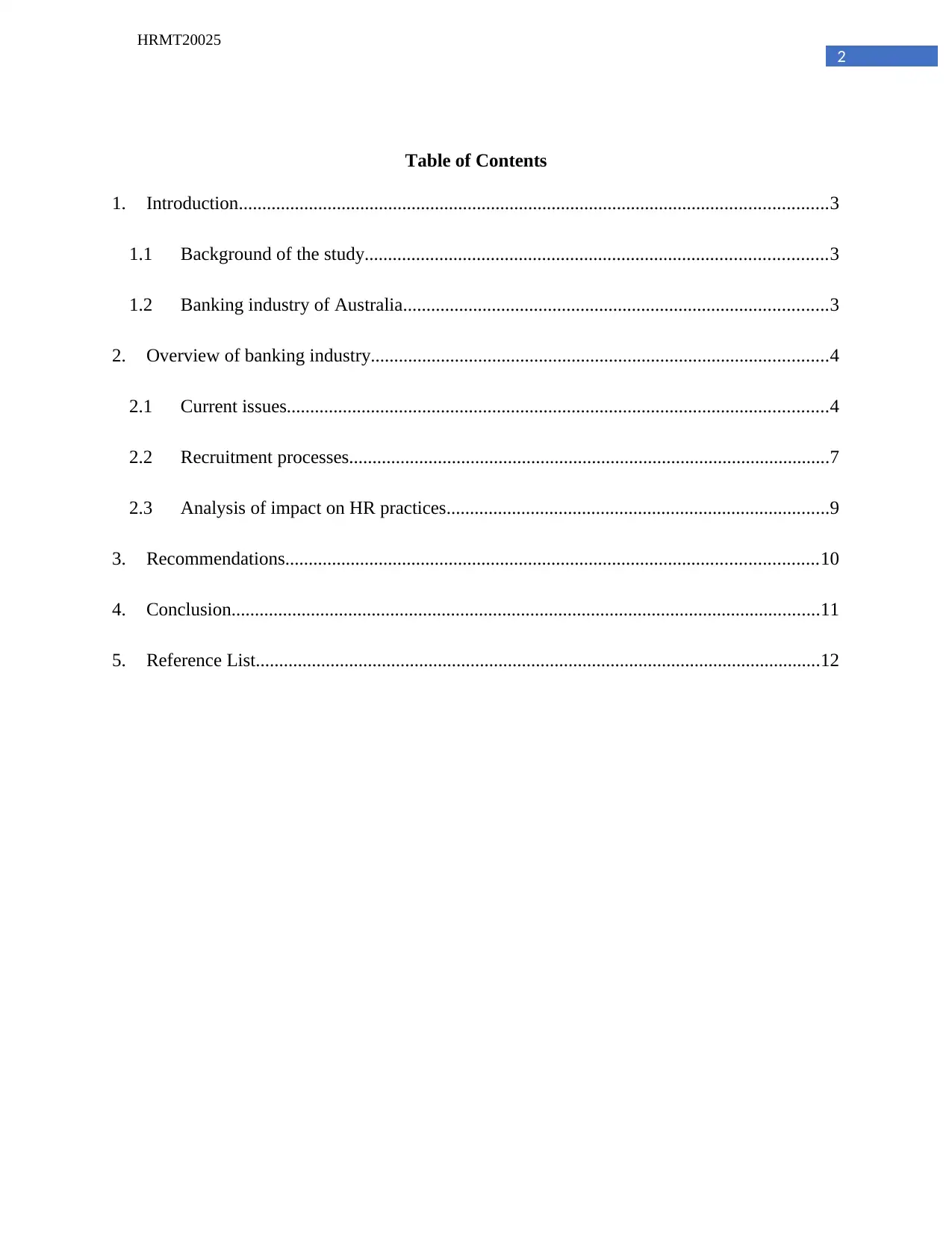
2
HRMT20025
Table of Contents
1. Introduction..............................................................................................................................3
1.1 Background of the study...................................................................................................3
1.2 Banking industry of Australia...........................................................................................3
2. Overview of banking industry..................................................................................................4
2.1 Current issues....................................................................................................................4
2.2 Recruitment processes.......................................................................................................7
2.3 Analysis of impact on HR practices..................................................................................9
3. Recommendations..................................................................................................................10
4. Conclusion..............................................................................................................................11
5. Reference List.........................................................................................................................12
HRMT20025
Table of Contents
1. Introduction..............................................................................................................................3
1.1 Background of the study...................................................................................................3
1.2 Banking industry of Australia...........................................................................................3
2. Overview of banking industry..................................................................................................4
2.1 Current issues....................................................................................................................4
2.2 Recruitment processes.......................................................................................................7
2.3 Analysis of impact on HR practices..................................................................................9
3. Recommendations..................................................................................................................10
4. Conclusion..............................................................................................................................11
5. Reference List.........................................................................................................................12
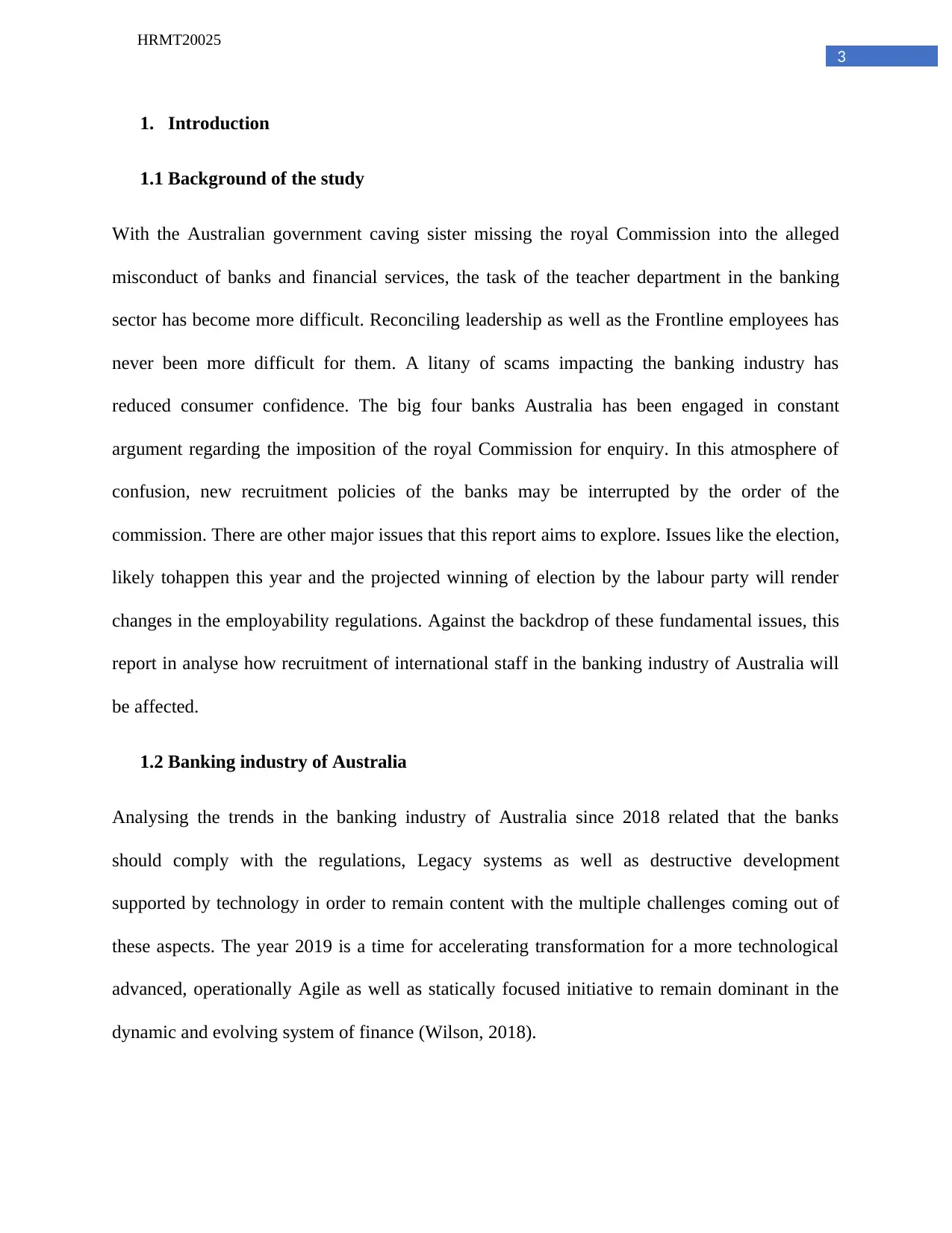
3
HRMT20025
1. Introduction
1.1 Background of the study
With the Australian government caving sister missing the royal Commission into the alleged
misconduct of banks and financial services, the task of the teacher department in the banking
sector has become more difficult. Reconciling leadership as well as the Frontline employees has
never been more difficult for them. A litany of scams impacting the banking industry has
reduced consumer confidence. The big four banks Australia has been engaged in constant
argument regarding the imposition of the royal Commission for enquiry. In this atmosphere of
confusion, new recruitment policies of the banks may be interrupted by the order of the
commission. There are other major issues that this report aims to explore. Issues like the election,
likely tohappen this year and the projected winning of election by the labour party will render
changes in the employability regulations. Against the backdrop of these fundamental issues, this
report in analyse how recruitment of international staff in the banking industry of Australia will
be affected.
1.2 Banking industry of Australia
Analysing the trends in the banking industry of Australia since 2018 related that the banks
should comply with the regulations, Legacy systems as well as destructive development
supported by technology in order to remain content with the multiple challenges coming out of
these aspects. The year 2019 is a time for accelerating transformation for a more technological
advanced, operationally Agile as well as statically focused initiative to remain dominant in the
dynamic and evolving system of finance (Wilson, 2018).
HRMT20025
1. Introduction
1.1 Background of the study
With the Australian government caving sister missing the royal Commission into the alleged
misconduct of banks and financial services, the task of the teacher department in the banking
sector has become more difficult. Reconciling leadership as well as the Frontline employees has
never been more difficult for them. A litany of scams impacting the banking industry has
reduced consumer confidence. The big four banks Australia has been engaged in constant
argument regarding the imposition of the royal Commission for enquiry. In this atmosphere of
confusion, new recruitment policies of the banks may be interrupted by the order of the
commission. There are other major issues that this report aims to explore. Issues like the election,
likely tohappen this year and the projected winning of election by the labour party will render
changes in the employability regulations. Against the backdrop of these fundamental issues, this
report in analyse how recruitment of international staff in the banking industry of Australia will
be affected.
1.2 Banking industry of Australia
Analysing the trends in the banking industry of Australia since 2018 related that the banks
should comply with the regulations, Legacy systems as well as destructive development
supported by technology in order to remain content with the multiple challenges coming out of
these aspects. The year 2019 is a time for accelerating transformation for a more technological
advanced, operationally Agile as well as statically focused initiative to remain dominant in the
dynamic and evolving system of finance (Wilson, 2018).
⊘ This is a preview!⊘
Do you want full access?
Subscribe today to unlock all pages.

Trusted by 1+ million students worldwide
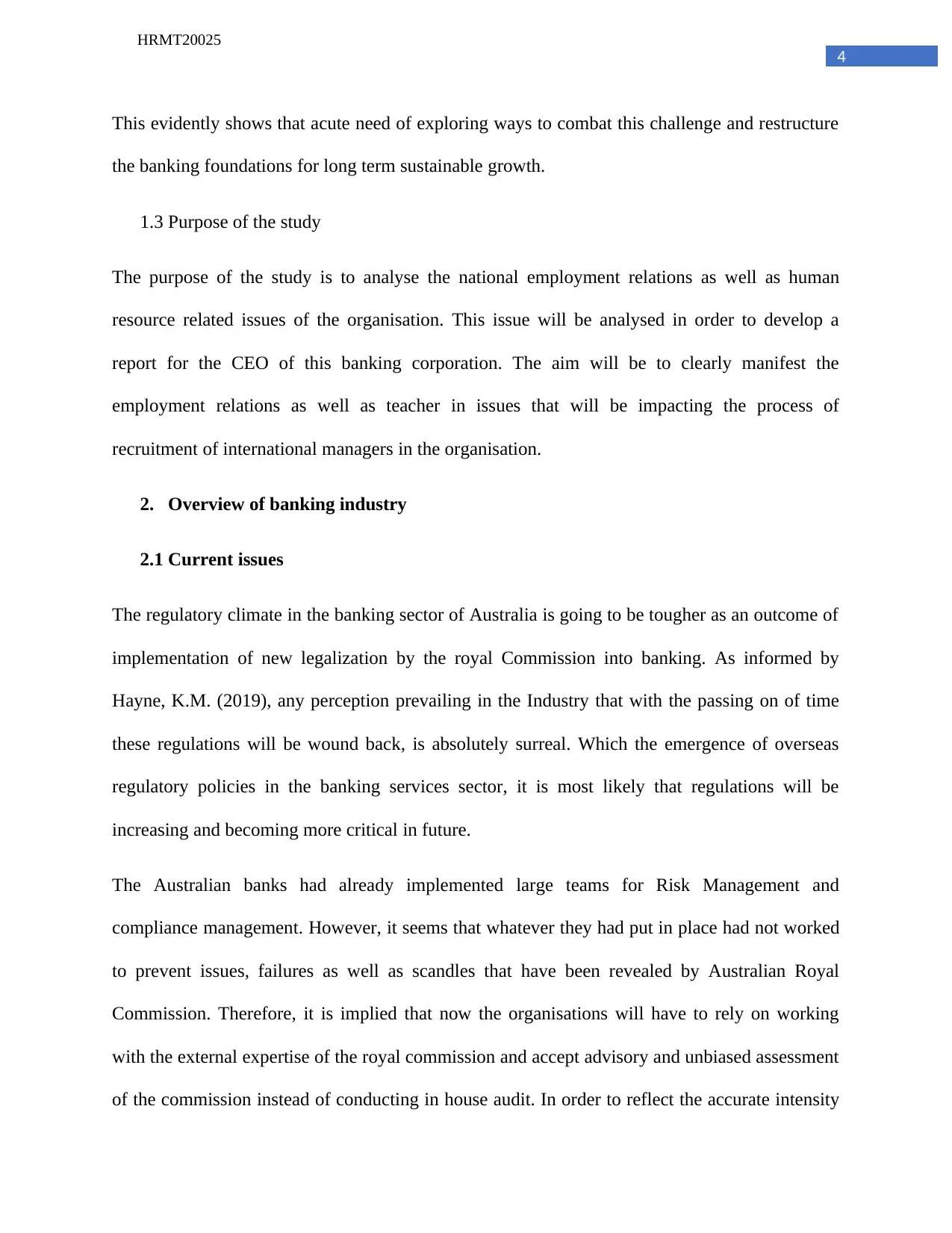
4
HRMT20025
This evidently shows that acute need of exploring ways to combat this challenge and restructure
the banking foundations for long term sustainable growth.
1.3 Purpose of the study
The purpose of the study is to analyse the national employment relations as well as human
resource related issues of the organisation. This issue will be analysed in order to develop a
report for the CEO of this banking corporation. The aim will be to clearly manifest the
employment relations as well as teacher in issues that will be impacting the process of
recruitment of international managers in the organisation.
2. Overview of banking industry
2.1 Current issues
The regulatory climate in the banking sector of Australia is going to be tougher as an outcome of
implementation of new legalization by the royal Commission into banking. As informed by
Hayne, K.M. (2019), any perception prevailing in the Industry that with the passing on of time
these regulations will be wound back, is absolutely surreal. Which the emergence of overseas
regulatory policies in the banking services sector, it is most likely that regulations will be
increasing and becoming more critical in future.
The Australian banks had already implemented large teams for Risk Management and
compliance management. However, it seems that whatever they had put in place had not worked
to prevent issues, failures as well as scandles that have been revealed by Australian Royal
Commission. Therefore, it is implied that now the organisations will have to rely on working
with the external expertise of the royal commission and accept advisory and unbiased assessment
of the commission instead of conducting in house audit. In order to reflect the accurate intensity
HRMT20025
This evidently shows that acute need of exploring ways to combat this challenge and restructure
the banking foundations for long term sustainable growth.
1.3 Purpose of the study
The purpose of the study is to analyse the national employment relations as well as human
resource related issues of the organisation. This issue will be analysed in order to develop a
report for the CEO of this banking corporation. The aim will be to clearly manifest the
employment relations as well as teacher in issues that will be impacting the process of
recruitment of international managers in the organisation.
2. Overview of banking industry
2.1 Current issues
The regulatory climate in the banking sector of Australia is going to be tougher as an outcome of
implementation of new legalization by the royal Commission into banking. As informed by
Hayne, K.M. (2019), any perception prevailing in the Industry that with the passing on of time
these regulations will be wound back, is absolutely surreal. Which the emergence of overseas
regulatory policies in the banking services sector, it is most likely that regulations will be
increasing and becoming more critical in future.
The Australian banks had already implemented large teams for Risk Management and
compliance management. However, it seems that whatever they had put in place had not worked
to prevent issues, failures as well as scandles that have been revealed by Australian Royal
Commission. Therefore, it is implied that now the organisations will have to rely on working
with the external expertise of the royal commission and accept advisory and unbiased assessment
of the commission instead of conducting in house audit. In order to reflect the accurate intensity
Paraphrase This Document
Need a fresh take? Get an instant paraphrase of this document with our AI Paraphraser
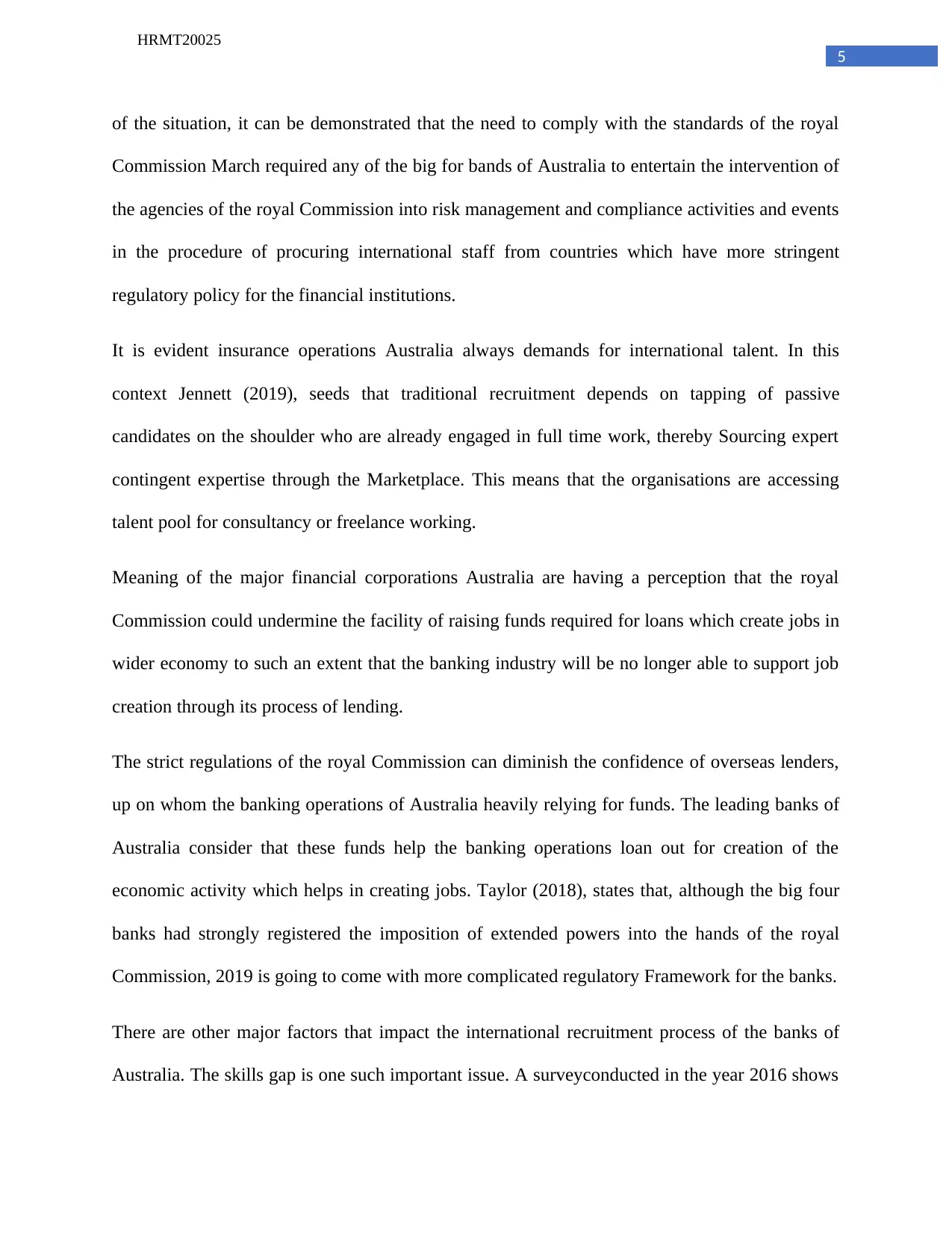
5
HRMT20025
of the situation, it can be demonstrated that the need to comply with the standards of the royal
Commission March required any of the big for bands of Australia to entertain the intervention of
the agencies of the royal Commission into risk management and compliance activities and events
in the procedure of procuring international staff from countries which have more stringent
regulatory policy for the financial institutions.
It is evident insurance operations Australia always demands for international talent. In this
context Jennett (2019), seeds that traditional recruitment depends on tapping of passive
candidates on the shoulder who are already engaged in full time work, thereby Sourcing expert
contingent expertise through the Marketplace. This means that the organisations are accessing
talent pool for consultancy or freelance working.
Meaning of the major financial corporations Australia are having a perception that the royal
Commission could undermine the facility of raising funds required for loans which create jobs in
wider economy to such an extent that the banking industry will be no longer able to support job
creation through its process of lending.
The strict regulations of the royal Commission can diminish the confidence of overseas lenders,
up on whom the banking operations of Australia heavily relying for funds. The leading banks of
Australia consider that these funds help the banking operations loan out for creation of the
economic activity which helps in creating jobs. Taylor (2018), states that, although the big four
banks had strongly registered the imposition of extended powers into the hands of the royal
Commission, 2019 is going to come with more complicated regulatory Framework for the banks.
There are other major factors that impact the international recruitment process of the banks of
Australia. The skills gap is one such important issue. A surveyconducted in the year 2016 shows
HRMT20025
of the situation, it can be demonstrated that the need to comply with the standards of the royal
Commission March required any of the big for bands of Australia to entertain the intervention of
the agencies of the royal Commission into risk management and compliance activities and events
in the procedure of procuring international staff from countries which have more stringent
regulatory policy for the financial institutions.
It is evident insurance operations Australia always demands for international talent. In this
context Jennett (2019), seeds that traditional recruitment depends on tapping of passive
candidates on the shoulder who are already engaged in full time work, thereby Sourcing expert
contingent expertise through the Marketplace. This means that the organisations are accessing
talent pool for consultancy or freelance working.
Meaning of the major financial corporations Australia are having a perception that the royal
Commission could undermine the facility of raising funds required for loans which create jobs in
wider economy to such an extent that the banking industry will be no longer able to support job
creation through its process of lending.
The strict regulations of the royal Commission can diminish the confidence of overseas lenders,
up on whom the banking operations of Australia heavily relying for funds. The leading banks of
Australia consider that these funds help the banking operations loan out for creation of the
economic activity which helps in creating jobs. Taylor (2018), states that, although the big four
banks had strongly registered the imposition of extended powers into the hands of the royal
Commission, 2019 is going to come with more complicated regulatory Framework for the banks.
There are other major factors that impact the international recruitment process of the banks of
Australia. The skills gap is one such important issue. A surveyconducted in the year 2016 shows
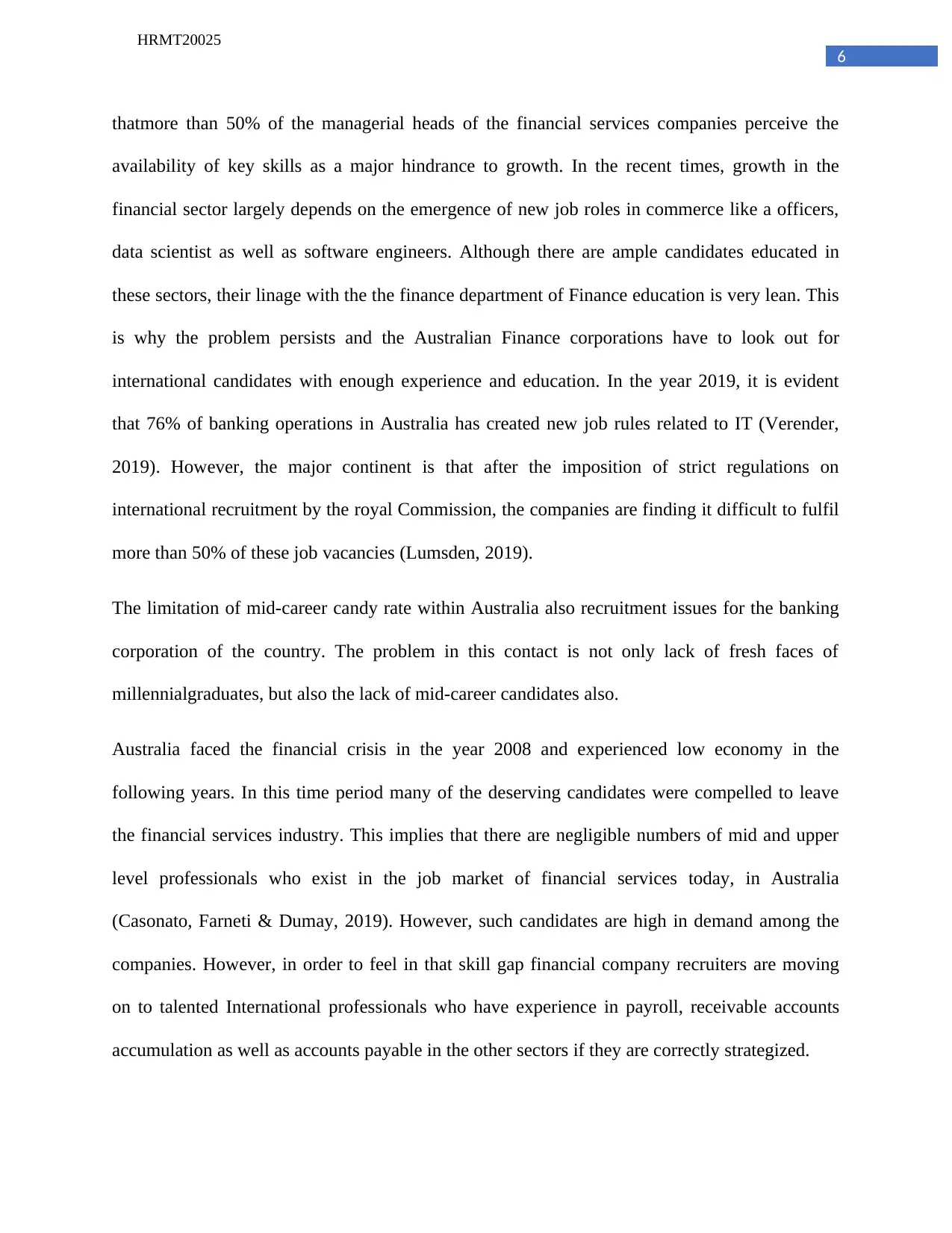
6
HRMT20025
thatmore than 50% of the managerial heads of the financial services companies perceive the
availability of key skills as a major hindrance to growth. In the recent times, growth in the
financial sector largely depends on the emergence of new job roles in commerce like a officers,
data scientist as well as software engineers. Although there are ample candidates educated in
these sectors, their linage with the the finance department of Finance education is very lean. This
is why the problem persists and the Australian Finance corporations have to look out for
international candidates with enough experience and education. In the year 2019, it is evident
that 76% of banking operations in Australia has created new job rules related to IT (Verender,
2019). However, the major continent is that after the imposition of strict regulations on
international recruitment by the royal Commission, the companies are finding it difficult to fulfil
more than 50% of these job vacancies (Lumsden, 2019).
The limitation of mid-career candy rate within Australia also recruitment issues for the banking
corporation of the country. The problem in this contact is not only lack of fresh faces of
millennialgraduates, but also the lack of mid-career candidates also.
Australia faced the financial crisis in the year 2008 and experienced low economy in the
following years. In this time period many of the deserving candidates were compelled to leave
the financial services industry. This implies that there are negligible numbers of mid and upper
level professionals who exist in the job market of financial services today, in Australia
(Casonato, Farneti & Dumay, 2019). However, such candidates are high in demand among the
companies. However, in order to feel in that skill gap financial company recruiters are moving
on to talented International professionals who have experience in payroll, receivable accounts
accumulation as well as accounts payable in the other sectors if they are correctly strategized.
HRMT20025
thatmore than 50% of the managerial heads of the financial services companies perceive the
availability of key skills as a major hindrance to growth. In the recent times, growth in the
financial sector largely depends on the emergence of new job roles in commerce like a officers,
data scientist as well as software engineers. Although there are ample candidates educated in
these sectors, their linage with the the finance department of Finance education is very lean. This
is why the problem persists and the Australian Finance corporations have to look out for
international candidates with enough experience and education. In the year 2019, it is evident
that 76% of banking operations in Australia has created new job rules related to IT (Verender,
2019). However, the major continent is that after the imposition of strict regulations on
international recruitment by the royal Commission, the companies are finding it difficult to fulfil
more than 50% of these job vacancies (Lumsden, 2019).
The limitation of mid-career candy rate within Australia also recruitment issues for the banking
corporation of the country. The problem in this contact is not only lack of fresh faces of
millennialgraduates, but also the lack of mid-career candidates also.
Australia faced the financial crisis in the year 2008 and experienced low economy in the
following years. In this time period many of the deserving candidates were compelled to leave
the financial services industry. This implies that there are negligible numbers of mid and upper
level professionals who exist in the job market of financial services today, in Australia
(Casonato, Farneti & Dumay, 2019). However, such candidates are high in demand among the
companies. However, in order to feel in that skill gap financial company recruiters are moving
on to talented International professionals who have experience in payroll, receivable accounts
accumulation as well as accounts payable in the other sectors if they are correctly strategized.
⊘ This is a preview!⊘
Do you want full access?
Subscribe today to unlock all pages.

Trusted by 1+ million students worldwide
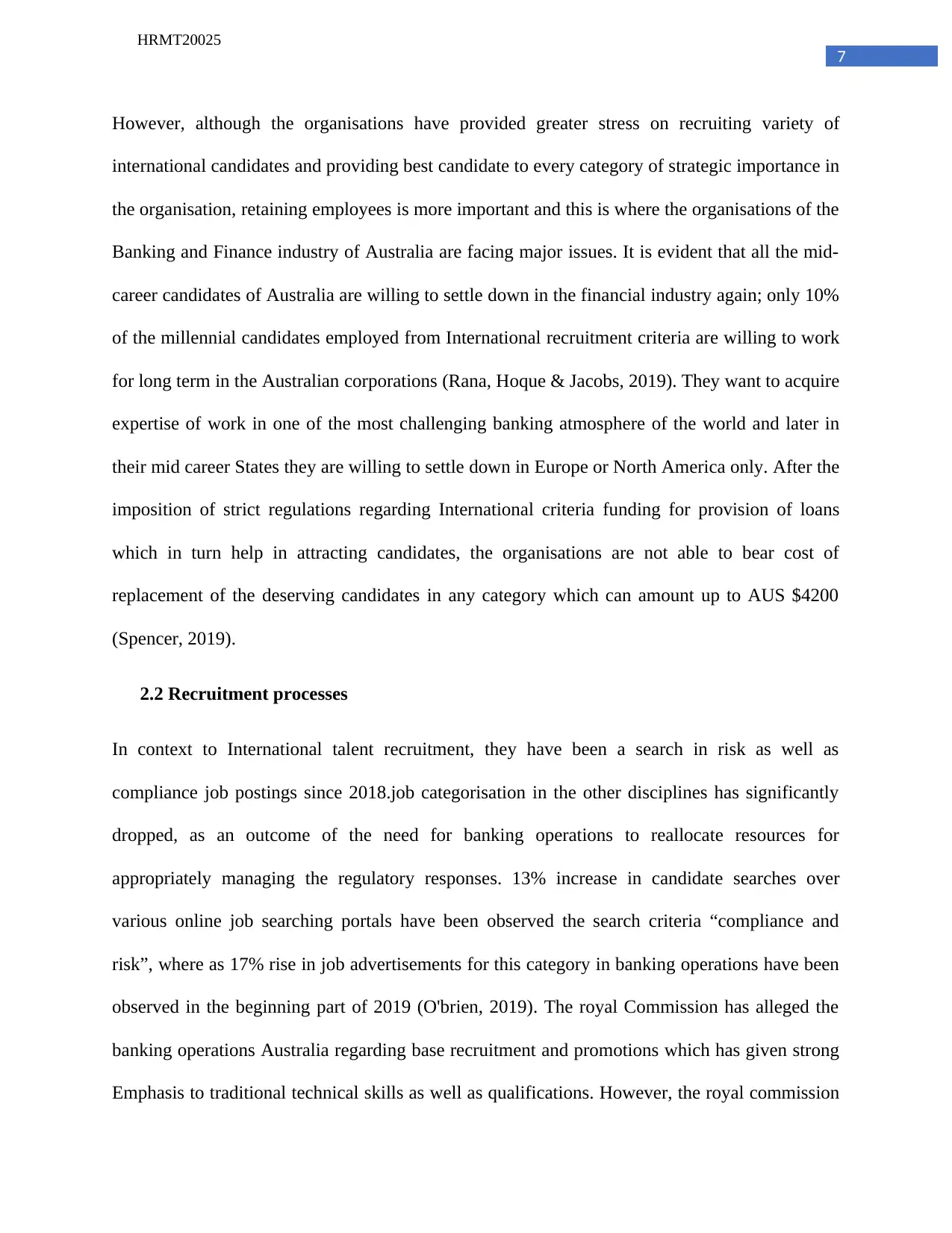
7
HRMT20025
However, although the organisations have provided greater stress on recruiting variety of
international candidates and providing best candidate to every category of strategic importance in
the organisation, retaining employees is more important and this is where the organisations of the
Banking and Finance industry of Australia are facing major issues. It is evident that all the mid-
career candidates of Australia are willing to settle down in the financial industry again; only 10%
of the millennial candidates employed from International recruitment criteria are willing to work
for long term in the Australian corporations (Rana, Hoque & Jacobs, 2019). They want to acquire
expertise of work in one of the most challenging banking atmosphere of the world and later in
their mid career States they are willing to settle down in Europe or North America only. After the
imposition of strict regulations regarding International criteria funding for provision of loans
which in turn help in attracting candidates, the organisations are not able to bear cost of
replacement of the deserving candidates in any category which can amount up to AUS $4200
(Spencer, 2019).
2.2 Recruitment processes
In context to International talent recruitment, they have been a search in risk as well as
compliance job postings since 2018.job categorisation in the other disciplines has significantly
dropped, as an outcome of the need for banking operations to reallocate resources for
appropriately managing the regulatory responses. 13% increase in candidate searches over
various online job searching portals have been observed the search criteria “compliance and
risk”, where as 17% rise in job advertisements for this category in banking operations have been
observed in the beginning part of 2019 (O'brien, 2019). The royal Commission has alleged the
banking operations Australia regarding base recruitment and promotions which has given strong
Emphasis to traditional technical skills as well as qualifications. However, the royal commission
HRMT20025
However, although the organisations have provided greater stress on recruiting variety of
international candidates and providing best candidate to every category of strategic importance in
the organisation, retaining employees is more important and this is where the organisations of the
Banking and Finance industry of Australia are facing major issues. It is evident that all the mid-
career candidates of Australia are willing to settle down in the financial industry again; only 10%
of the millennial candidates employed from International recruitment criteria are willing to work
for long term in the Australian corporations (Rana, Hoque & Jacobs, 2019). They want to acquire
expertise of work in one of the most challenging banking atmosphere of the world and later in
their mid career States they are willing to settle down in Europe or North America only. After the
imposition of strict regulations regarding International criteria funding for provision of loans
which in turn help in attracting candidates, the organisations are not able to bear cost of
replacement of the deserving candidates in any category which can amount up to AUS $4200
(Spencer, 2019).
2.2 Recruitment processes
In context to International talent recruitment, they have been a search in risk as well as
compliance job postings since 2018.job categorisation in the other disciplines has significantly
dropped, as an outcome of the need for banking operations to reallocate resources for
appropriately managing the regulatory responses. 13% increase in candidate searches over
various online job searching portals have been observed the search criteria “compliance and
risk”, where as 17% rise in job advertisements for this category in banking operations have been
observed in the beginning part of 2019 (O'brien, 2019). The royal Commission has alleged the
banking operations Australia regarding base recruitment and promotions which has given strong
Emphasis to traditional technical skills as well as qualifications. However, the royal commission
Paraphrase This Document
Need a fresh take? Get an instant paraphrase of this document with our AI Paraphraser
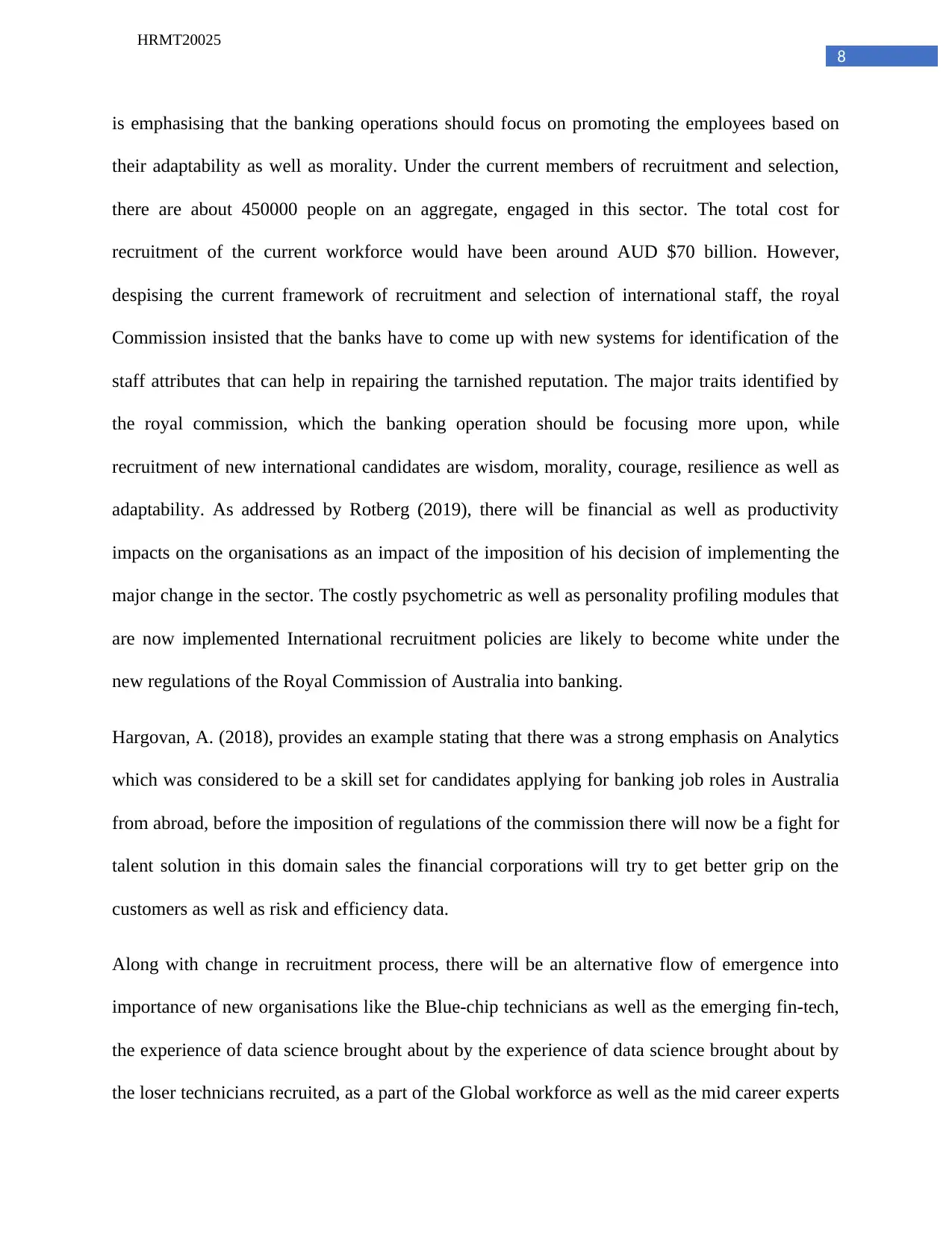
8
HRMT20025
is emphasising that the banking operations should focus on promoting the employees based on
their adaptability as well as morality. Under the current members of recruitment and selection,
there are about 450000 people on an aggregate, engaged in this sector. The total cost for
recruitment of the current workforce would have been around AUD $70 billion. However,
despising the current framework of recruitment and selection of international staff, the royal
Commission insisted that the banks have to come up with new systems for identification of the
staff attributes that can help in repairing the tarnished reputation. The major traits identified by
the royal commission, which the banking operation should be focusing more upon, while
recruitment of new international candidates are wisdom, morality, courage, resilience as well as
adaptability. As addressed by Rotberg (2019), there will be financial as well as productivity
impacts on the organisations as an impact of the imposition of his decision of implementing the
major change in the sector. The costly psychometric as well as personality profiling modules that
are now implemented International recruitment policies are likely to become white under the
new regulations of the Royal Commission of Australia into banking.
Hargovan, A. (2018), provides an example stating that there was a strong emphasis on Analytics
which was considered to be a skill set for candidates applying for banking job roles in Australia
from abroad, before the imposition of regulations of the commission there will now be a fight for
talent solution in this domain sales the financial corporations will try to get better grip on the
customers as well as risk and efficiency data.
Along with change in recruitment process, there will be an alternative flow of emergence into
importance of new organisations like the Blue-chip technicians as well as the emerging fin-tech,
the experience of data science brought about by the experience of data science brought about by
the loser technicians recruited, as a part of the Global workforce as well as the mid career experts
HRMT20025
is emphasising that the banking operations should focus on promoting the employees based on
their adaptability as well as morality. Under the current members of recruitment and selection,
there are about 450000 people on an aggregate, engaged in this sector. The total cost for
recruitment of the current workforce would have been around AUD $70 billion. However,
despising the current framework of recruitment and selection of international staff, the royal
Commission insisted that the banks have to come up with new systems for identification of the
staff attributes that can help in repairing the tarnished reputation. The major traits identified by
the royal commission, which the banking operation should be focusing more upon, while
recruitment of new international candidates are wisdom, morality, courage, resilience as well as
adaptability. As addressed by Rotberg (2019), there will be financial as well as productivity
impacts on the organisations as an impact of the imposition of his decision of implementing the
major change in the sector. The costly psychometric as well as personality profiling modules that
are now implemented International recruitment policies are likely to become white under the
new regulations of the Royal Commission of Australia into banking.
Hargovan, A. (2018), provides an example stating that there was a strong emphasis on Analytics
which was considered to be a skill set for candidates applying for banking job roles in Australia
from abroad, before the imposition of regulations of the commission there will now be a fight for
talent solution in this domain sales the financial corporations will try to get better grip on the
customers as well as risk and efficiency data.
Along with change in recruitment process, there will be an alternative flow of emergence into
importance of new organisations like the Blue-chip technicians as well as the emerging fin-tech,
the experience of data science brought about by the experience of data science brought about by
the loser technicians recruited, as a part of the Global workforce as well as the mid career experts
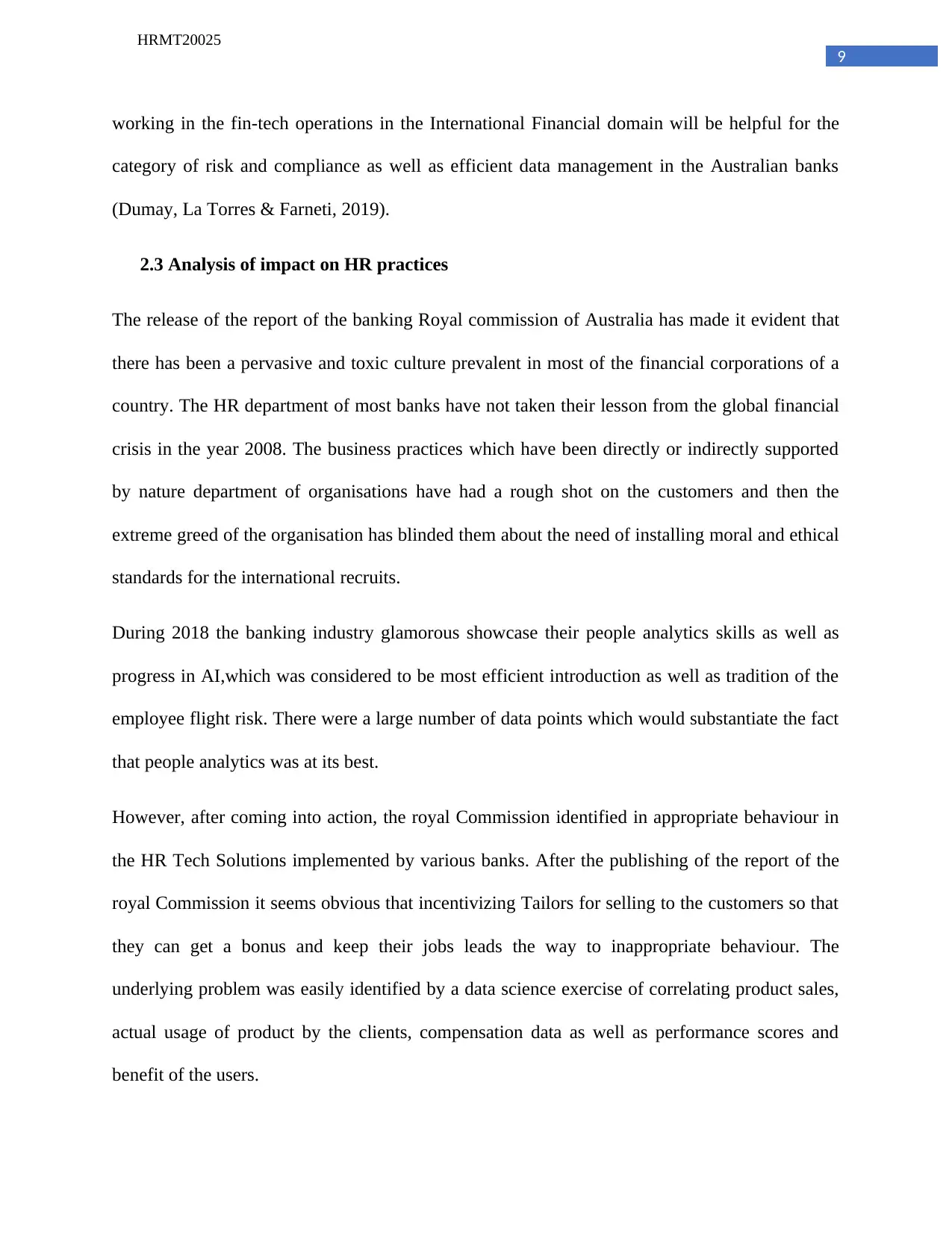
9
HRMT20025
working in the fin-tech operations in the International Financial domain will be helpful for the
category of risk and compliance as well as efficient data management in the Australian banks
(Dumay, La Torres & Farneti, 2019).
2.3 Analysis of impact on HR practices
The release of the report of the banking Royal commission of Australia has made it evident that
there has been a pervasive and toxic culture prevalent in most of the financial corporations of a
country. The HR department of most banks have not taken their lesson from the global financial
crisis in the year 2008. The business practices which have been directly or indirectly supported
by nature department of organisations have had a rough shot on the customers and then the
extreme greed of the organisation has blinded them about the need of installing moral and ethical
standards for the international recruits.
During 2018 the banking industry glamorous showcase their people analytics skills as well as
progress in AI,which was considered to be most efficient introduction as well as tradition of the
employee flight risk. There were a large number of data points which would substantiate the fact
that people analytics was at its best.
However, after coming into action, the royal Commission identified in appropriate behaviour in
the HR Tech Solutions implemented by various banks. After the publishing of the report of the
royal Commission it seems obvious that incentivizing Tailors for selling to the customers so that
they can get a bonus and keep their jobs leads the way to inappropriate behaviour. The
underlying problem was easily identified by a data science exercise of correlating product sales,
actual usage of product by the clients, compensation data as well as performance scores and
benefit of the users.
HRMT20025
working in the fin-tech operations in the International Financial domain will be helpful for the
category of risk and compliance as well as efficient data management in the Australian banks
(Dumay, La Torres & Farneti, 2019).
2.3 Analysis of impact on HR practices
The release of the report of the banking Royal commission of Australia has made it evident that
there has been a pervasive and toxic culture prevalent in most of the financial corporations of a
country. The HR department of most banks have not taken their lesson from the global financial
crisis in the year 2008. The business practices which have been directly or indirectly supported
by nature department of organisations have had a rough shot on the customers and then the
extreme greed of the organisation has blinded them about the need of installing moral and ethical
standards for the international recruits.
During 2018 the banking industry glamorous showcase their people analytics skills as well as
progress in AI,which was considered to be most efficient introduction as well as tradition of the
employee flight risk. There were a large number of data points which would substantiate the fact
that people analytics was at its best.
However, after coming into action, the royal Commission identified in appropriate behaviour in
the HR Tech Solutions implemented by various banks. After the publishing of the report of the
royal Commission it seems obvious that incentivizing Tailors for selling to the customers so that
they can get a bonus and keep their jobs leads the way to inappropriate behaviour. The
underlying problem was easily identified by a data science exercise of correlating product sales,
actual usage of product by the clients, compensation data as well as performance scores and
benefit of the users.
⊘ This is a preview!⊘
Do you want full access?
Subscribe today to unlock all pages.

Trusted by 1+ million students worldwide
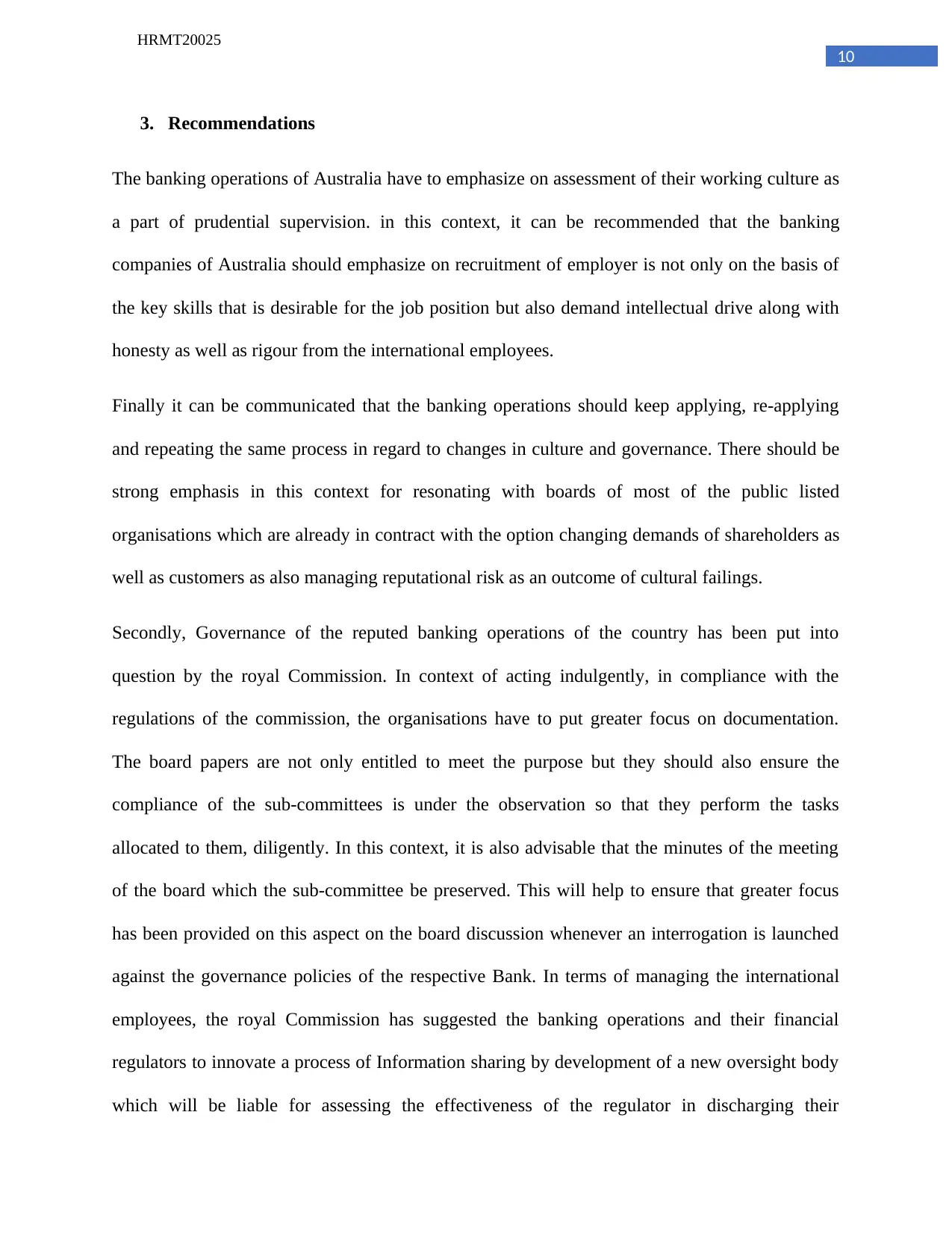
10
HRMT20025
3. Recommendations
The banking operations of Australia have to emphasize on assessment of their working culture as
a part of prudential supervision. in this context, it can be recommended that the banking
companies of Australia should emphasize on recruitment of employer is not only on the basis of
the key skills that is desirable for the job position but also demand intellectual drive along with
honesty as well as rigour from the international employees.
Finally it can be communicated that the banking operations should keep applying, re-applying
and repeating the same process in regard to changes in culture and governance. There should be
strong emphasis in this context for resonating with boards of most of the public listed
organisations which are already in contract with the option changing demands of shareholders as
well as customers as also managing reputational risk as an outcome of cultural failings.
Secondly, Governance of the reputed banking operations of the country has been put into
question by the royal Commission. In context of acting indulgently, in compliance with the
regulations of the commission, the organisations have to put greater focus on documentation.
The board papers are not only entitled to meet the purpose but they should also ensure the
compliance of the sub-committees is under the observation so that they perform the tasks
allocated to them, diligently. In this context, it is also advisable that the minutes of the meeting
of the board which the sub-committee be preserved. This will help to ensure that greater focus
has been provided on this aspect on the board discussion whenever an interrogation is launched
against the governance policies of the respective Bank. In terms of managing the international
employees, the royal Commission has suggested the banking operations and their financial
regulators to innovate a process of Information sharing by development of a new oversight body
which will be liable for assessing the effectiveness of the regulator in discharging their
HRMT20025
3. Recommendations
The banking operations of Australia have to emphasize on assessment of their working culture as
a part of prudential supervision. in this context, it can be recommended that the banking
companies of Australia should emphasize on recruitment of employer is not only on the basis of
the key skills that is desirable for the job position but also demand intellectual drive along with
honesty as well as rigour from the international employees.
Finally it can be communicated that the banking operations should keep applying, re-applying
and repeating the same process in regard to changes in culture and governance. There should be
strong emphasis in this context for resonating with boards of most of the public listed
organisations which are already in contract with the option changing demands of shareholders as
well as customers as also managing reputational risk as an outcome of cultural failings.
Secondly, Governance of the reputed banking operations of the country has been put into
question by the royal Commission. In context of acting indulgently, in compliance with the
regulations of the commission, the organisations have to put greater focus on documentation.
The board papers are not only entitled to meet the purpose but they should also ensure the
compliance of the sub-committees is under the observation so that they perform the tasks
allocated to them, diligently. In this context, it is also advisable that the minutes of the meeting
of the board which the sub-committee be preserved. This will help to ensure that greater focus
has been provided on this aspect on the board discussion whenever an interrogation is launched
against the governance policies of the respective Bank. In terms of managing the international
employees, the royal Commission has suggested the banking operations and their financial
regulators to innovate a process of Information sharing by development of a new oversight body
which will be liable for assessing the effectiveness of the regulator in discharging their
Paraphrase This Document
Need a fresh take? Get an instant paraphrase of this document with our AI Paraphraser
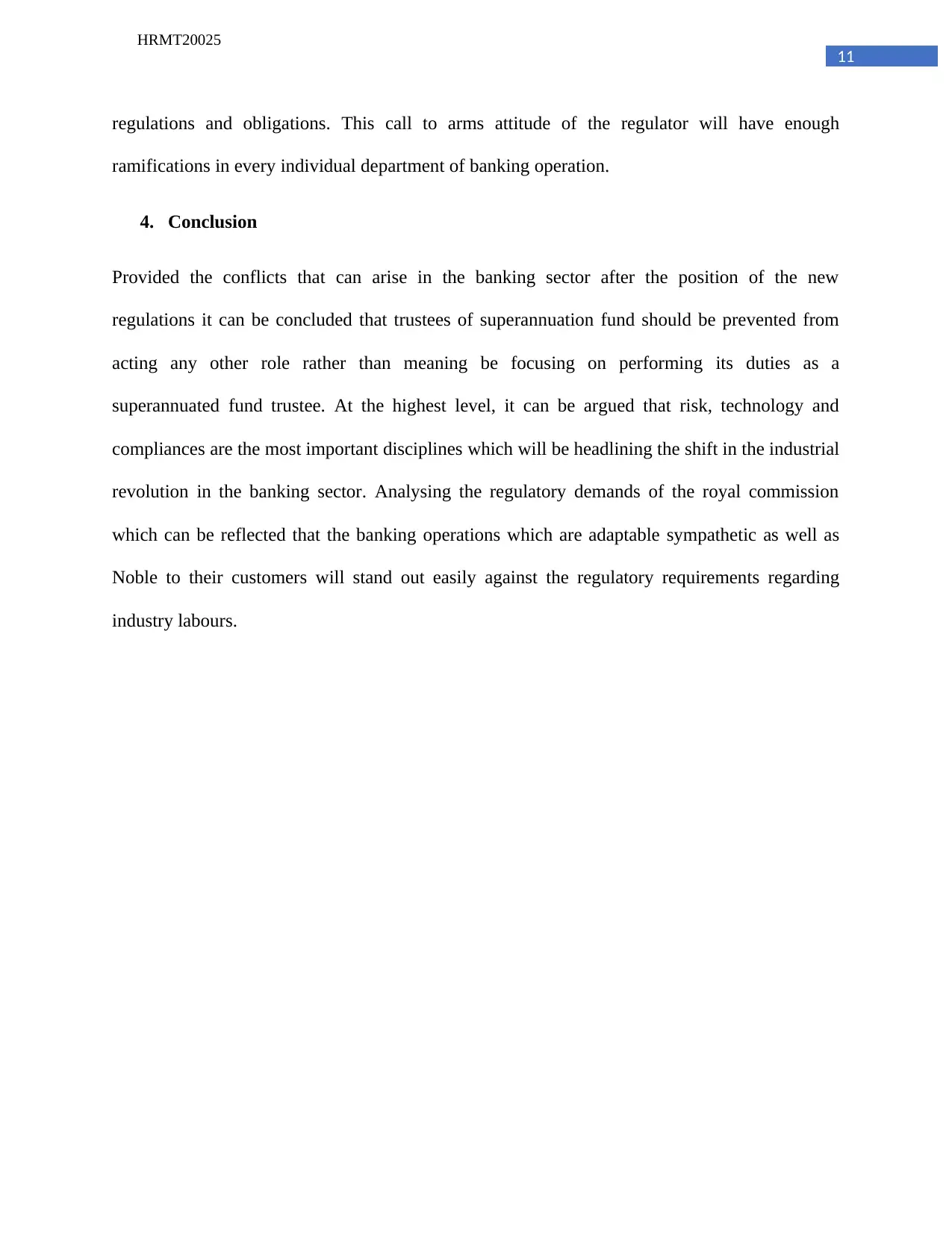
11
HRMT20025
regulations and obligations. This call to arms attitude of the regulator will have enough
ramifications in every individual department of banking operation.
4. Conclusion
Provided the conflicts that can arise in the banking sector after the position of the new
regulations it can be concluded that trustees of superannuation fund should be prevented from
acting any other role rather than meaning be focusing on performing its duties as a
superannuated fund trustee. At the highest level, it can be argued that risk, technology and
compliances are the most important disciplines which will be headlining the shift in the industrial
revolution in the banking sector. Analysing the regulatory demands of the royal commission
which can be reflected that the banking operations which are adaptable sympathetic as well as
Noble to their customers will stand out easily against the regulatory requirements regarding
industry labours.
HRMT20025
regulations and obligations. This call to arms attitude of the regulator will have enough
ramifications in every individual department of banking operation.
4. Conclusion
Provided the conflicts that can arise in the banking sector after the position of the new
regulations it can be concluded that trustees of superannuation fund should be prevented from
acting any other role rather than meaning be focusing on performing its duties as a
superannuated fund trustee. At the highest level, it can be argued that risk, technology and
compliances are the most important disciplines which will be headlining the shift in the industrial
revolution in the banking sector. Analysing the regulatory demands of the royal commission
which can be reflected that the banking operations which are adaptable sympathetic as well as
Noble to their customers will stand out easily against the regulatory requirements regarding
industry labours.
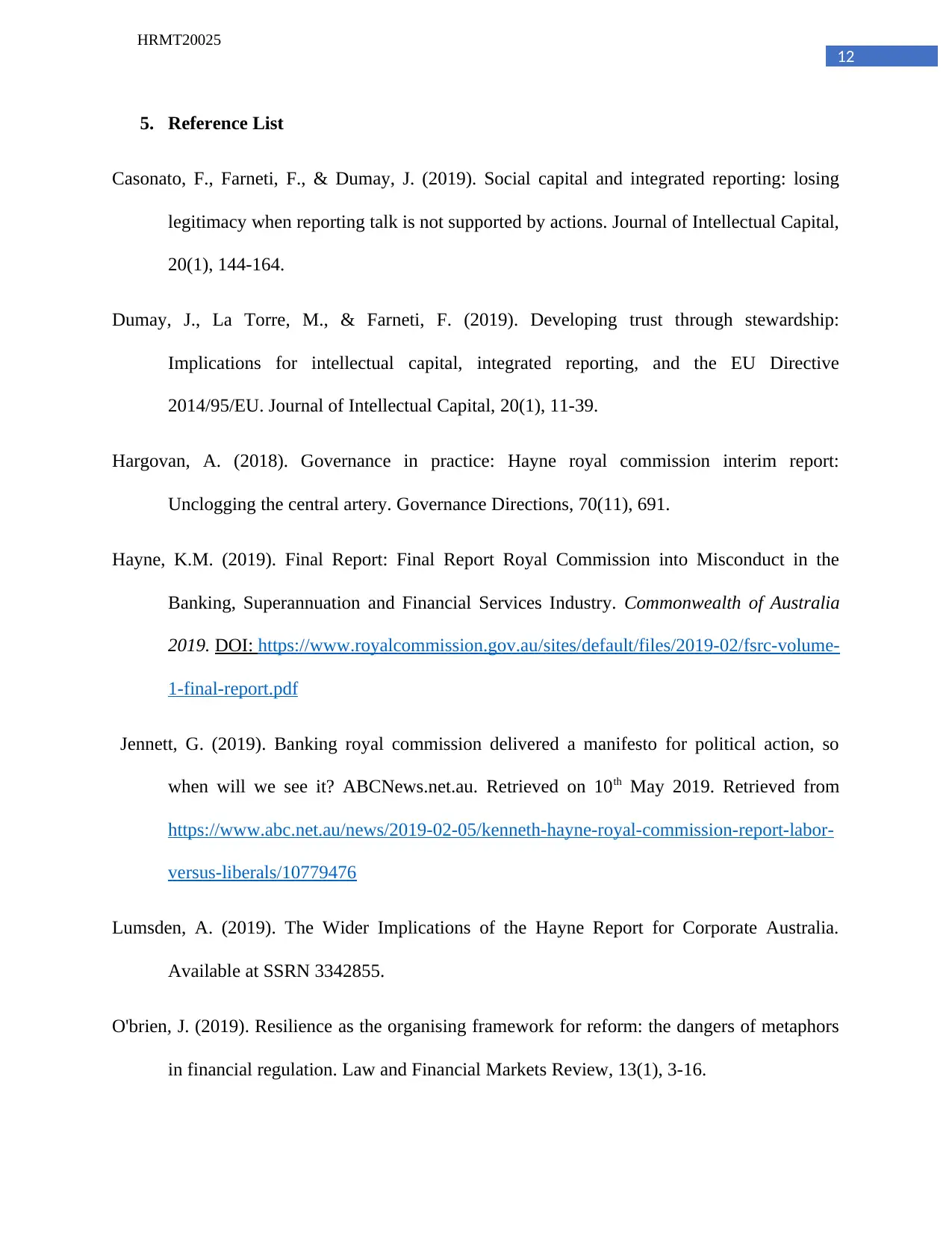
12
HRMT20025
5. Reference List
Casonato, F., Farneti, F., & Dumay, J. (2019). Social capital and integrated reporting: losing
legitimacy when reporting talk is not supported by actions. Journal of Intellectual Capital,
20(1), 144-164.
Dumay, J., La Torre, M., & Farneti, F. (2019). Developing trust through stewardship:
Implications for intellectual capital, integrated reporting, and the EU Directive
2014/95/EU. Journal of Intellectual Capital, 20(1), 11-39.
Hargovan, A. (2018). Governance in practice: Hayne royal commission interim report:
Unclogging the central artery. Governance Directions, 70(11), 691.
Hayne, K.M. (2019). Final Report: Final Report Royal Commission into Misconduct in the
Banking, Superannuation and Financial Services Industry. Commonwealth of Australia
2019. DOI: https://www.royalcommission.gov.au/sites/default/files/2019-02/fsrc-volume-
1-final-report.pdf
Jennett, G. (2019). Banking royal commission delivered a manifesto for political action, so
when will we see it? ABCNews.net.au. Retrieved on 10th May 2019. Retrieved from
https://www.abc.net.au/news/2019-02-05/kenneth-hayne-royal-commission-report-labor-
versus-liberals/10779476
Lumsden, A. (2019). The Wider Implications of the Hayne Report for Corporate Australia.
Available at SSRN 3342855.
O'brien, J. (2019). Resilience as the organising framework for reform: the dangers of metaphors
in financial regulation. Law and Financial Markets Review, 13(1), 3-16.
HRMT20025
5. Reference List
Casonato, F., Farneti, F., & Dumay, J. (2019). Social capital and integrated reporting: losing
legitimacy when reporting talk is not supported by actions. Journal of Intellectual Capital,
20(1), 144-164.
Dumay, J., La Torre, M., & Farneti, F. (2019). Developing trust through stewardship:
Implications for intellectual capital, integrated reporting, and the EU Directive
2014/95/EU. Journal of Intellectual Capital, 20(1), 11-39.
Hargovan, A. (2018). Governance in practice: Hayne royal commission interim report:
Unclogging the central artery. Governance Directions, 70(11), 691.
Hayne, K.M. (2019). Final Report: Final Report Royal Commission into Misconduct in the
Banking, Superannuation and Financial Services Industry. Commonwealth of Australia
2019. DOI: https://www.royalcommission.gov.au/sites/default/files/2019-02/fsrc-volume-
1-final-report.pdf
Jennett, G. (2019). Banking royal commission delivered a manifesto for political action, so
when will we see it? ABCNews.net.au. Retrieved on 10th May 2019. Retrieved from
https://www.abc.net.au/news/2019-02-05/kenneth-hayne-royal-commission-report-labor-
versus-liberals/10779476
Lumsden, A. (2019). The Wider Implications of the Hayne Report for Corporate Australia.
Available at SSRN 3342855.
O'brien, J. (2019). Resilience as the organising framework for reform: the dangers of metaphors
in financial regulation. Law and Financial Markets Review, 13(1), 3-16.
⊘ This is a preview!⊘
Do you want full access?
Subscribe today to unlock all pages.

Trusted by 1+ million students worldwide
1 out of 13
Related Documents
Your All-in-One AI-Powered Toolkit for Academic Success.
+13062052269
info@desklib.com
Available 24*7 on WhatsApp / Email
![[object Object]](/_next/static/media/star-bottom.7253800d.svg)
Unlock your academic potential
Copyright © 2020–2025 A2Z Services. All Rights Reserved. Developed and managed by ZUCOL.




